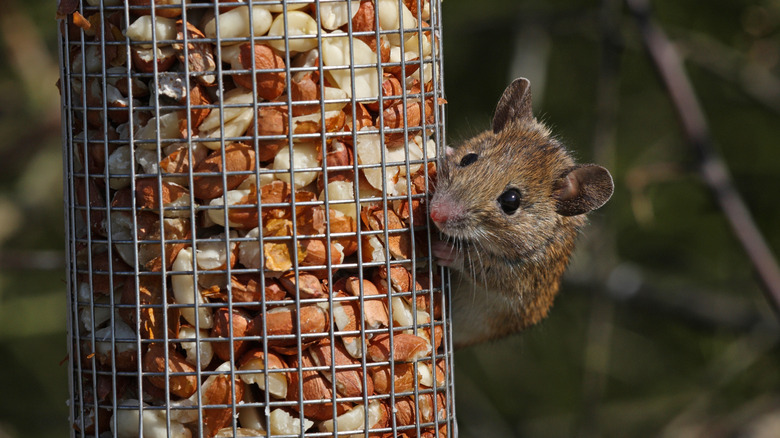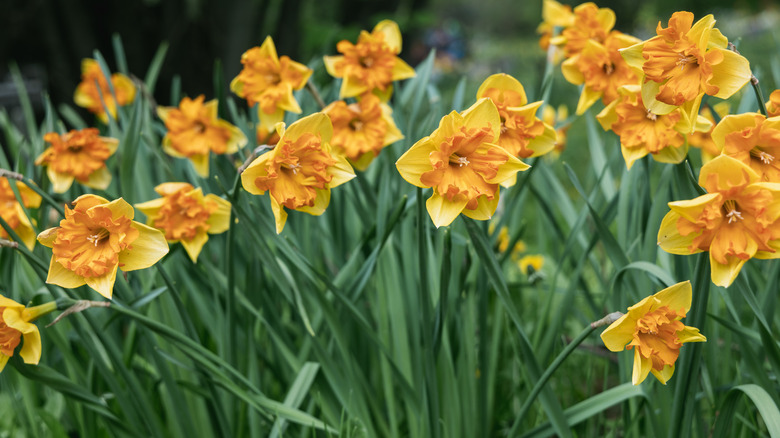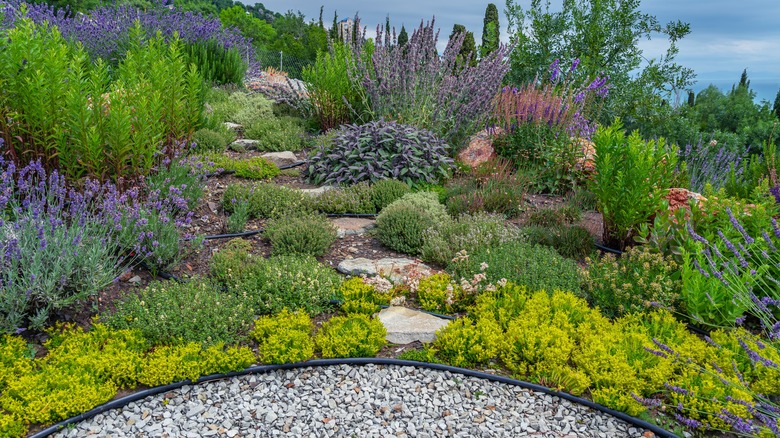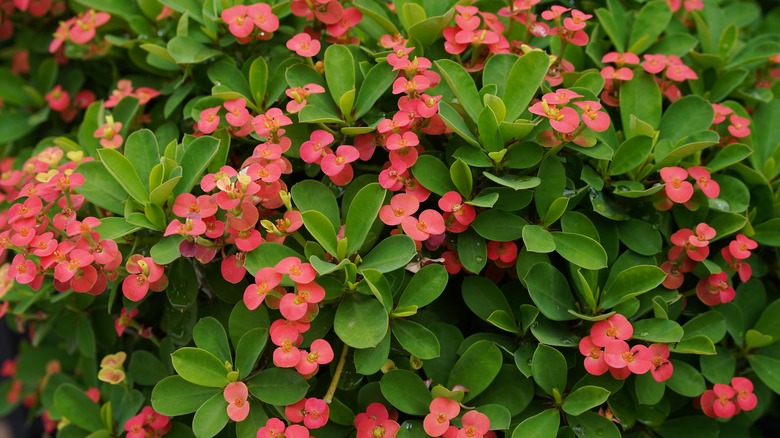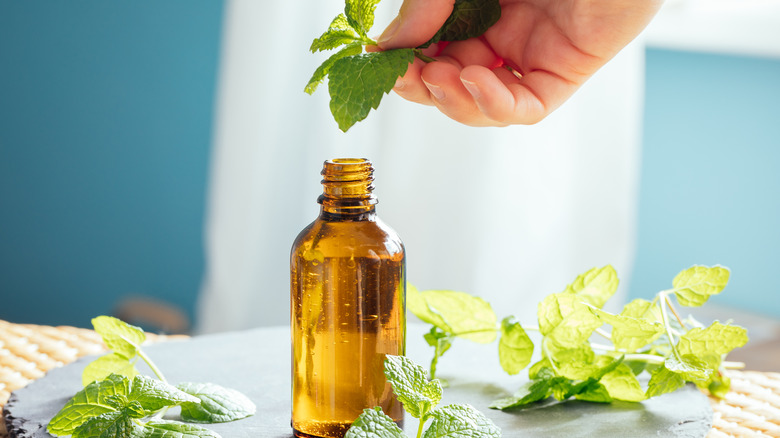Protect Your Bird Feeder From Unwanted Rodents With These Natural Solutions
We may receive a commission on purchases made from links.
There are lots of tips and tricks for keeping your bird feeder squirrel-free, but squirrels aren't the only rodents you have to worry about. Yes, squirrels are members of the order Rodentia, the same as mice and rats, though not nearly as dangerous to humans. If squirrels are overtaking your bird feeders, it's an annoyance, but if your bird feeders are being swarmed by rats or mice, it might be a sign of a serious problem, or it might lead to one. Rat infestations spread disease — through their droppings as well as from the rats themselves — and can cause thousands of dollars in damages. If you're an ornithophile who loves watching the birds feeding in your yard, the best course of action is to keep rats and mice from coming around in the first place. Thankfully there are several natural ways to do this, such as using rodent-repelling flowers, herbs, shrubs, and sprays.
Chemical treatments and poisons are effective at killing rodents, but they're not very effective at keeping them away in the first place. Moreover, if you already have a rodent infestation, poisons won't necessarily outpace the reproductive efforts of the animals, leaving you with more than you manage to exterminate. Worst of all, poisons and chemicals can be harmful to other animals, and your ecosystem in general, for years after their application. They should only be considered as an absolute last resort and should be administered by an experienced professional.
Flowers to keep away rats and mice
What better way to naturally deter mice and rats from settling down in your garden than planting some beautiful, fragrant flowers? You'll love them, but the rodents will be put off by their overwhelming scents and won't bother seeking out food or shelter there. Some good ones that rats and mice both hate are chrysanthemums and daffodils.
Chrysanthemums contain a natural insecticide, and while they aren't high in toxicity to animals, they can cause some problems in dogs and cats, per PetMD, (and in humans with ragweed allergies). However, with or without a ragweed allergy, rodents don't like the smell of the flowers. Similarly, daffodils are beautifully fragrant to humans but odoriferous to mice and rats. Moreover, their bulbs are bitter and toxic. If you have pets that roam freely in a fenced-in backyard, try planting chrysanthemums and daffodils around your front yard bird feeders to keep rodents at bay, but if you have pets that regularly wander outdoors, trying a different method might be wiser for their well-being.
Rodent-repellent herb garden staples
Take your herb garden to the next level by planting copious amounts of rosemary, lavender, and sage. Not only are these beautiful, aromatic plants that will up your culinary game, but they also offer natural pest control by way of keeping rats and mice far away from your yard. Rosemary, most effective around the edges of your property where rodents might be looking for ways in, is not harmful to pets or children but will deter rats and mice — especially if the stems are cut, so harvest it regularly for your cooking needs. Lavender is another plant that has such a strong botanical scent, rodents are naturally repelled, but its gorgeous purple flowers make it very appealing to gardeners and pollinators alike, potentially attracting hummingbirds to your yard as well. According to the ASPCA, however, it has a mild toxicity to pets, so keep the two separate however you can.
Another herb with a powerful scent is the sage bush (not to be confused with sagebrush). This shrubbery can grow as high as 3 feet tall, and just rubbing against the leaves releases its scent, so any rodents that find their way into your yard will be immediately deterred once they come into contact with your sage. Both green and white sage varieties work, too, so plant whichever is your favorite, or go wild and plant both. Rats and mice won't want anything to do with your yard.
Try some naturally toxic shrubs to block entry points
Rats and mice typically go for the path of least resistance and their diet generally consists of what is available to them. The birdseed in your yard may be appealing, but if you make it hard or inconvenient to get to, they likely won't go to the trouble. That's why another good way to keep these rodents out of your yard is by blocking entry points with shrubbery that's toxic, like elderberry or crown-of-thorns.
The elderberry shrub actually has many medicinal uses, so in addition to its scent deterring rodents, you want to make sure you plant the black- or blue-fruit variety in your yard because those are the only types that have edible berries (if cooked – do not eat raw elderberries, per Medical News Today). Every other part of the plant contains tiny amounts of cyanide and should not be ingested. If you suspect a child or pet has eaten even a small amount of raw elderberries, contact the appropriate emergency services.
The crown-of-thorns — or Christ-plant — is another shrub with toxic properties, this one through its sap. If you take a careful cutting of some of the pretty red flowers off this plant, the exposure of the sap will be dangerous to all whose skin comes into contact with it, including yours, so wear gloves, per NC State University. Moreover, as the name indicates, its stems are covered in sharp barbs that most animals will avoid on principle.
Make your own rodent deterrent spray
Many other natural ingredients — from citronella to peppermint – work at deterring rats and mice from your garden and, by extension, your bird feeders, but they need to be extracted from their plant forms to be most effective. To do this you can still grow these herbs in your garden, but you'll need to harvest them, extract their oils, and mix them into a repellant to really see results. Citronella and peppermint oil can be purchased on Amazon or at craft and discount stores, like Walmart.
Another ingredient you can add to your stores is pepper. Crushed red pepper, black pepper, and cayenne pepper are all highly detestable to rats and mice. Both taste and smell are too pungent and too bitter for the rodents. Moreover, sprinkling pepper around your yard periodically won't hurt your plants, your pets, your kids, or the birds you want to attract to your feeders. You can use just pepper, or a single essential oil, or mix and match them into a concoction all your own that you spray around your yard and bird feeders in particular to keep dangerous rodents away without disrupting your bird-watching activities.
